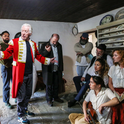Few theatres stir up division like the Royal Court, which is choosing a new artistic director as we write. Ian Rickson is presiding over the 50th birthday celebrations before leaving and even the partying has been partisan. William Gaskill, artistic director in the glory days, has withdrawn his services in protest at the inclusion of a Tom Stoppard play, on the grounds that Stoppard has never previously had anything to do with the Court, and that Trevor Nunn (ditto) is directing it. (Could Nunn's presence in Sloane Square be a pitch for artistic directorship?) Gaskill's withdrawal has inadvertently drawn attention to the fact that the Court lacks a defining vision these days. An adventurous appointment could renew the Court's vanguard policy of big new plays with big actors. Contenders being whispered about include: Dominic Cooke (the insider, and a confirmed champion of new writing); John Caird (the big name; he'd certainly change the Court's direction, and perhaps bring in some bold musicals); John Tiffany (his production of Mercury Fur, walkouts and all, was a high point of 2005, but would he leave his post at the embryonic National Theatre of Scotland to add some grit to the Court's glitz?); Thea Sharrock (the media darling, she's making a success of her time at the Gate but does she have the wildness to lead the Court?); Terry Johnson (doubly qualified as both playwright and director); and Rufus Norris (his recent productions have catapulted him into the top league of directors. He may not be interested in running the Court but perhaps should be).
The EU art levy is here
After years of campaigning against the EU imposition of the droit de suite levy on the British art market, the government has given up. The levy, which pays artists and their heirs royalties on a sliding scale when their work is resold up to 70 years after the artist's death, looks as if it represents justice for artists—why should they sell their works for a pittance only to see them sold on for a fortune? But opponents have argued that it would damage the British art market, sending dealers and collectors scurrying to the US while those purchasers remaining in Britain sought discounts to offset the levy. Moreover, the windfalls may not be as substantial as artists hope. A European Fine Art Foundation report suggests that the real beneficiaries will be artists' heirs, who anyway benefit from reproduction fees. The EU had insisted on applying the levy to Britain in the interests of harmonisation but the government fought for concessions, most importantly that droit de suite should not apply to work by a living artist sold in Britain for less than €3,000 (around £2,050). Then the patent office announced that the threshold for the levy would be a mere €1,000 (around £685), lower than other countries and a figure that brings some of the cheapest works within the levy's remit, and adding to the hassle and cost of buying contemporary art.
Iain Banks outbrains everyone
Hugely popular and good on whisky, Scottish author Iain Banks has emerged as the supreme general knowledge nerd-master of literary Britain. On 2nd January, he captained a team of writers (the others were television dramatists Jimmy McGovern, Andrew Davies and Tony Marchant) on the final of University Challenge: The Professionals, slaughtering the news team (Nick Robinson, Kate Adie, Michael Buerk and Bridget Kendall) by 190-45. That same night, he won Celebrity Mastermind, with his specialist topic "Malt Whisky and the Distilleries of Scotland." Here's an open invitation for Banks to become an honorary member of the Prospect team should we ever appear on University Challenge (watch this space).











